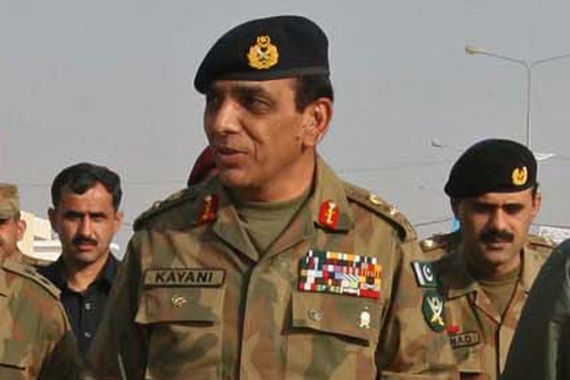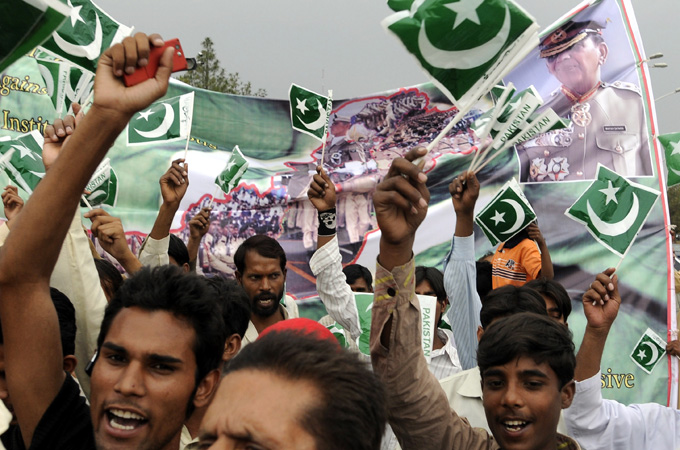‘Pressure’ on Pakistan army head over US ties
General Kayani reportedly fighting to keep his job after killing of al-Qaeda chief Osama bin Laden by US forces in May.

 |
| Many Pakistanis were angered after US special forces killed bin Laden in a secret raid on Abbottabad EPA] |
Pakistan’s army chief is reportedly fighting to keep his job after the killing of al-Qaeda chief Osama Bin Laden by US forces last month.
General Ashfaq Parvez Kayani is facing criticism from his colleagues for his close relationship with the US.
The discontent with Kayani has reached such a level that a colonels’ coup is not out of the question, the New York Times quoted Pakistani and US sources as saying on Thursday.
The report said Kayani had toured of more than a dozen garrisons, mess halls and other institutions to gather support in the six weeks since the May 2 in which US special forces killed Bin Laden in Abbottabad near Islamabad.
However, Al Jazeera’s Imtiaz Tyab, reporting from Islamabad, said military sources told him Kayani is very deeply respected by his army.
“Certainly he’s under a lot of pressure but to suggest that he’ll be replaced or that there will be some kind of internal coup, I think that’s too early to say,” he said.
“But it’s fair to suggest that things are very difficult for the Pakistani military and times are certainly very tough for Kayani as well.”
The US did not inform Islamabad before carrying out the raid on bin Laden’s compound, leaving Pakistan’s military and intelligence frustrated and humiliated after the operation invited allegations of incompetence and complicity.
‘Important relationship’
Meanwhile, US legislators have been similarly displeased, complaining that Pakistani co-operation remains unreliable despite a huge aid package from Washington that has totaled more than $20bn since 2001.
The politicians have denounced Pakistan’s arrest of several Pakistani informants who provided intelligence to the CIA about bin Laden’s compound, saying authorities should instead go after the support network which allowed bin Laden to hide in.
At a White House briefing on Wednesday, spokesman Jay Carney said the US relationship with Pakistan was “extremely important”.
|
“Most governments lie to each other. That’s the way business gets done” Robert Gates, US defense secretary |
Carney said it was in the national security interest of the US to maintain the relationship, albeit strained.
“Pakistan has worked with us to go after terrorism and terrorists. More terrorists have been killed on Pakistani soil than in any other country,” Carney said.
Meanwhile, US Defense Secretary Robert Gates was questioned by one senator on how the US can trust and support governments like Pakistan and Afghanistan .
Democratic Senator Patrick Leahy, of Vermont, demanded to know how long the US would “support governments that lie to us”.
“When do we say enough is enough?” he asked.
“Based on 27 years in CIA and four and a half years in this job, most governments lie to each other. That’s the way business gets done,” Gates said.
“Do they also arrest the people that help us, when they say they’re allies?” Leahy continued.
“Sometimes,”Gates replied, adding that “sometimes they send people to spy on us, and they’re our close allies. That’s the real world that we deal with.”
Al Jazeera’s Tyab said there is a “real sense of anger” in Pakistan directed towards the US since the killing of bin Laden, with people saying the unilateral raid broke Pakistan’s sovereignty.
“Another reason is the drone strikes in the north of the country which have resulted in so many deaths of civilians. These strikes have continued unabated since May 2,” he said.
“There’s also a general sense of anger over the Taliban attacks, which have increased so much since the killing of bin Laden.”
Tyab said the Taliban were punishing the Pakistani people for the country’s military relationship with the US.